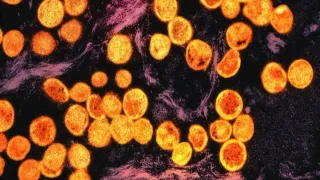September 25, 2015
Pro 140 Shown to Block HIV Infection for a Whole Year
EDGE null READ TIME: 4 MIN.
The successes keep piling up for CytoDyn Inc.'s potent new antibody, PRO 1400. After a year of receiving weekly PRO 140 monotherapy, the first group of patients in an extension study have now reached one full year of viral load suppression.
"We are pleased to see PRO 140 provide HIV patients with an almost a non-toxic therapy for one whole year," said Dr. Nader Pourhassan, CytoDyn Inc. President/CEO. "The Company is also encouraged by our discussions with the FDA to advance the clinical assessment of PRO 140 in an effort to get it to the market as soon as possible. Although delighted to have recently initiated our Phase 3 registration trial (a 25-week study with 300 subjects), we will now request an FDA meeting to discuss another Phase 3 registration trial for 'Long-Term PRO 140 Monotherapy.'"
CytoDyn's PRO 140 Phase 2b study was concluded in January 2015. Following the initial 13-week treatment period, patients with viral load suppression could continue receiving weekly PRO 140 monotherapy in an extension study. Those enrolled in this study are infected with strains of HIV that utilize the CCR5 co-receptor. The PRO 140 monoclonal antibody targets CCR5 with high affinity and potently blocks HIV infection. These patients substituted their daily Highly Active Antiretroviral Therapy (HAART) regimen with weekly subcutaneous injections (one 350mg dose) of PRO 140 monotherapy throughout the trial and extension study.
With almost zero HIV transmission rates possible, CytoDyn Inc.'s new viral-entry inhibitor PRO 140 may also offer patients the return to normal life. The FDA trial expects to document a five-fold drop in viral loads within one week of one dose.
"When an HIV patient's viral load is completely suppressed by using PRO 140, the transmission rate becomes almost zero. Subsequently, the fear of infecting others is mostly removed allowing the return to a normal life," said Pourhassan.
PRO 140 is a fully humanized IgG4 monoclonal antibody directed against CCR5, a molecular portal that HIV uses to enter T-cells. PRO 140 blocks the predominant HIV (R5) subtype entry into T-cells by masking this required co-receptor, CCR5. Importantly PRO 140 does not appear to interfere with the normal function of CCR5 in mediating immune responses. It does not have agonist activity towards CCR5 but does have antagonist activity to CCL5 which is a central mediator in inflammatory diseases.
Pourhassan said that they have had remarkable success reducing viral loads. In a previous study, some patients who continued on an extension, are still experiencing a completely suppressed viral load after 11 months. The primary goal of their current Phase 3 FDA trial is to reduce the viral load in HIV patients by five-fold in one week with one 350mg dose of PRO 140.
"When we enter the final 24 weeks, the 300 patients in the study will change their failing pill regimens to newly optimized regimens coupled with a weekly 350mg dose of PRO 140," he said. "We are very encouraged with the success of prior PRO 140 studies and expect excellent Phase 3 results."
In previously documented studies, injecting PRO 140 has reduced viral loads by as much as 2.5log and 1.8log. The primary goal of the Phase 3 FDA trial is to reduce the viral load in HIV patients by 0.7 log; a 5-fold drop in one week with one 350mg dose of PRO 140.
Now, when they enter the final 24 weeks of the FDA approved Phase 3 trial, the 300 patients in the study will change their failing pill regimens to a newly optimized regimen coupled with a weekly 350mg dose of PRO 140.
"We are very encouraged with the success of prior PRO 140 studies and expect excellent Phase 3 results. PRO 140 may become a commercial product in 2017," said Dr. Pourhassan.
With over 1.2 million individuals already infected with HIV in the U.S., and new infections surpassing 50K year after year, PRO 140 has received more than $28M in grants from the NIH. PRO 140 has a "fast track candidate" designation by the FDA with the possibility of accelerated approval upon successful completion of Phase 3 trials.
For more information on the Company, visit www.cytodyn.com.






